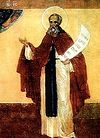

| Previous day | Next day |
| Old Style
February 13
|
Monday |
New Style
February 26
|
|
2nd Week of Great Lent.
Tone 5.
Great Lent. |
Monastic rule: xerophagy (bread, uncooked fruits and vegetables).
|
![]() St. Martinian, monk, of Caesarea in Palestine (5th c.), and Sts. Zoe of Bethlehem and the virgin Photina (5th c.). Archbishop Seraphim (Sobolev) of Bogucharsk, Bulgaria (1950).
St. Martinian, monk, of Caesarea in Palestine (5th c.), and Sts. Zoe of Bethlehem and the virgin Photina (5th c.). Archbishop Seraphim (Sobolev) of Bogucharsk, Bulgaria (1950).
St. Eulogius, patriarch of Alexandria (607-608). St. Symeon the Myrrh-gusher, prince of Serbia (1200). St. Joseph, founder of Volokolamsk (Volotsk) Monastery (1515). St. George (Konissky), archbishop of Mogilev (1795).
New Hieromartyr Sylvester (Olshevsky), archbishop of Omsk (1920). New Hieromartyrs Leontius Grimalsky, archpriest, of Gzhel (Moscow) and Zosima Trubachev, archpriest, of Maloyaroslavets (1938).
Apostle Aquila of the Seventy, and St. Priscilla (1st c.) St. Timothy, archbishop of Alexandria (385). St. Castor of Karden, hieromonk and missionary (Germany) (ca. 400). St. Modomnoc, bishop of Ossory (Ireland) (6th c.).
Repose of Abbess Seraphima of Sezenovo (1877).
Thoughts for Each Day of the Year
According to the Daily Church Readings from the Word of God
By St. Theophan the Recluse

Monday (2nd week of Lent).
Keep thy heart with all diligence; for out of it are the issues of life (Prov. 4:23).[1] Having prepared,[2] confessed and taken communion with the holy mysteries, a Christian renews within himself the grace-filled springs which were opened in him through holy Baptism, and which then so many times were obstructed by carelessness and falls, and so many times cleansed by repentance. Now these springs have been cleansed once again after the most recent falls. Let us keep them, at least from this point onward, from renewed obstruction as a result of thoughtlessness, distractedness, and negligence about those actions which maintain the springs’ purity and proper flow of waters. Let us continue fasting, not give liberty to our feelings, not cease fervent prayers and tears, not forget works of love; let seek to hear the word of God, and most of all, to converse with the Lord, Who is within us. Through this conversation we shall uphold the fear of God and zeal to please Him within ourselves, for in this lies the spring of our spiritual life.
[1]The Slavonic for Prov. 4:23 reads: Keep thy heart more than all things kept; for out of it are the springs of life.
[2]“Having prepared…” in Russian, govenie. See footnote for Tuesday of the 1st week of Great Lent.
Articles
 Venerable Martinian of Caesarea, in PalestineSaint Martinian went to live in the wilderness at the age of eighteen, not far from the city of Caesarea in Palestine. |
 St. ZoeSaint Zoe remained on the island, where she spent six years in solitude, and then she gave up her soul to God. |
 St. PhotinaSaint Photina remained on the island, where she spent six years in solitude, and then she gave up her soul to God. |
 St. Eulogius the Archbishop of AlexandriaSaint Eulogius, Patriarch of Alexandria, was one of the enlightened hierarchs of the sixth century. |






